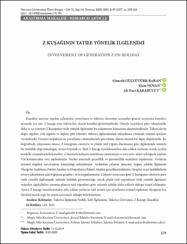Z Kuşağının Tatile Yönelik İlgilenimi
Abstract
Kuşaklar üzerine yapılan çalışmalar, pazarlama ve tüketici davranışı açısından güncel araştırma konuları arasında yer alır. Z kuşağı yeni tüketiciler olarak kendini göstermektedir. Önceki kuşaklara göre teknolojiyle daha iç içe yaşayan Z kuşağının tatile yönelik ilgilenimi bu çalışmanın konusunu oluşturmaktadır. Tüketicilerin değer algıları, risk algıları ve ilgileri gibi etkenler tüketici ilgileniminin anlaşılması yönünde önemli ipuçları vermektedir. Cinsiyet değişkeni ise pazarlama çalışmalarında göz önüne alınan önemli bir diğer değişkendir. Bu doğrultuda çalışmanın amacı, Z kuşağının cinsiyete ve planlı tatil yapma durumuna göre ilgilenimde anlamlı bir farklılık olup olmadığını ortaya koymak ve Türk Z kuşağı örnekleminden elde edilen verilerin teorik açıdan modelle uyumunu belirlemektir. Çalışmada kolayda örnekleme yöntemiyle ve yüz yüze anket tekniğiyle toplam 314 katılımcıdan veri toplanmıştır. Veriler üzerinde geçerlilik ve güvenirlilik analizleri yapılmıştır. Verilerin normal dağılım varsayımını karşıladığı anlaşılmıştır. Ardından çalışma amacına uygun şekilde İlgilenim Ölçeği’ne Açıklayıcı Faktör Analizi ve Doğrulayıcı Faktör Analizi gerçekleştirilmiştir. Gruplar arası farklılıkların ortaya çıkarılması için bağımsız gruplar t testi uygulanmıştır. Çalışma sonucuna göre Z kuşağının cinsiyete göre tatile yönelik ilgilenimde anlamlı farklılık göstermediği, ancak planlı tatil yapanların tatile yönelik ilgisinin/ üründen algıladıkları önemin plansız tatil yapanlara göre anlamlı şekilde daha yüksek olduğu tespit edilmiştir. Ayrıca Z kuşağı örnekleminden elde edilen verilerin tatil ürünü için uyarlanan orijinal ilgilenim ölçeğinin beş faktörlü teorik yapı ile uyum içerisinde olduğu belirlenmiştir. Studies on generations are among the current research topics in marketing and consumer behavior. Generation Z shows itself as new consumers. The involvement of Generation Z, which is more intertwined with technology than the previous generations, is the topic of this study. Factors such as value perceptions, risk perceptions and interests of consumers give important clues in understanding consumer involvement. Gender variable is another important variable taken into consideration in marketing studies. In this respect, the aim of this study is to determine whether there is a significant difference in the involvement of Generation Z according to gender and planned holiday status, and to determine the theoretical fit of the data obtained from the Turkish Z Generation sample with the model. In this study, data were collected from a total of 314 participants with convenience sampling method and face-to-face survey technique. Validity and reliability analyses were performed on the data. As the data meet the normal distribution assumption, then we conducted Explanatory Factor Analysis and Confirmatory Factor Analysis to the Involvement Scale in accordance with the purpose of the study. Independent samples t test was used to reveal differences between groups. According to the results of the study, it was found that Generation Z did not show a significant difference in the involvement for holiday by gender, but for the participants who planned their holidays, the interest/perceived importance from the holiday was significantly higher than who did not make plan for holiday. In addition, it was determined that the original involvement scale adapted for the holiday product of the data obtained from Generation Z was in fit with the five-factor of the theoretical structure.


















